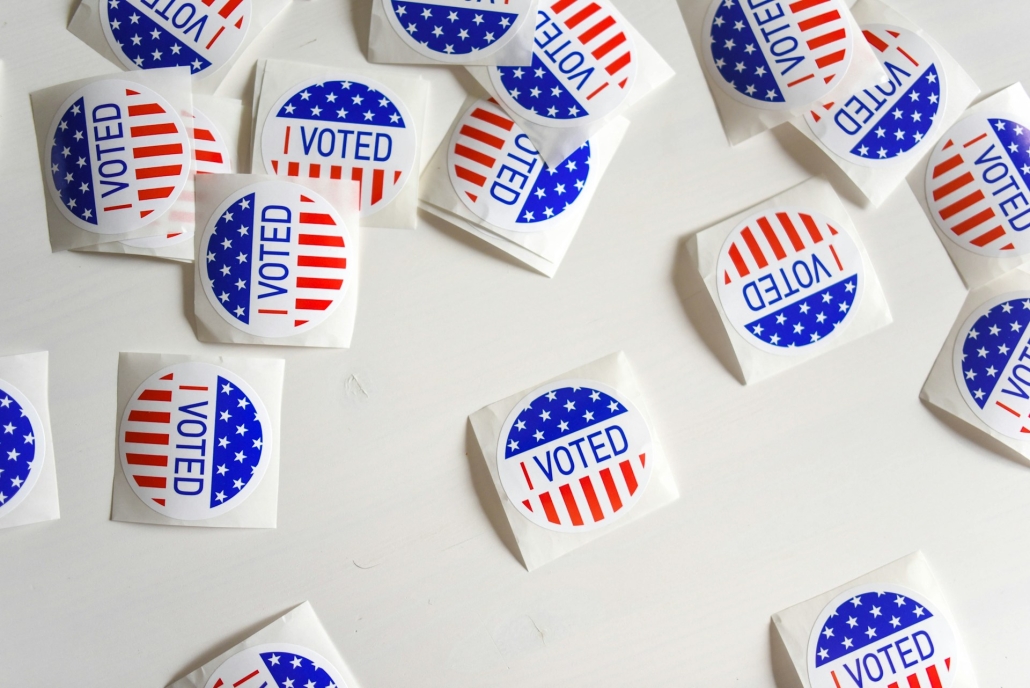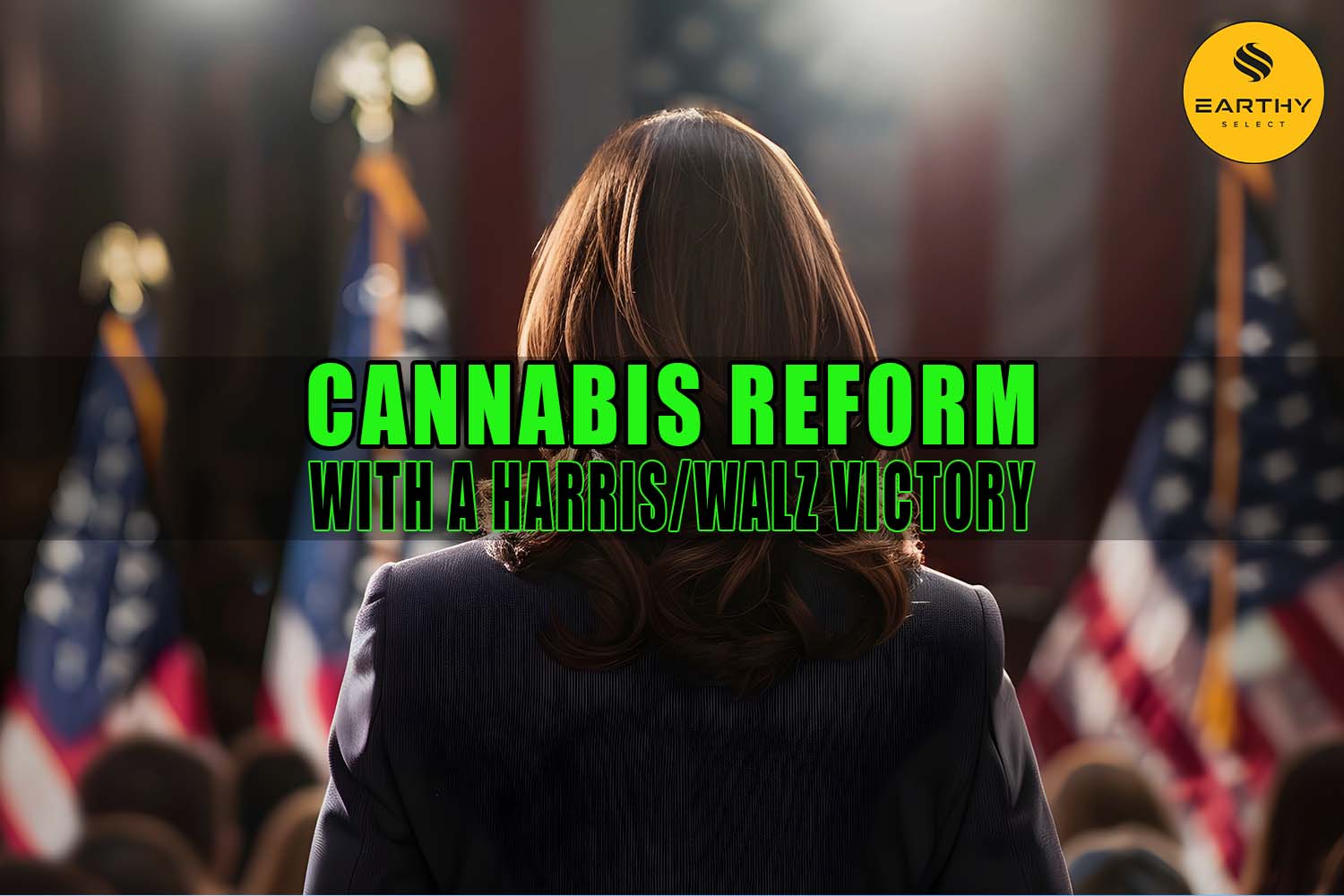Cannabis Reform With a Harris-Walz Victory
This article is not approved or sponsored by any candidate or political group.
The issue of cannabis reform has remained a hot topic in U.S. politics, with debates on how to best regulate marijuana shaping national conversations. In recent years, the push to fully legalize cannabis for both adult use and medical purposes has gained substantial momentum. So the question lingers, if Kamala Harris and Tim Walz, both known for their progressive stance on cannabis, win the upcoming election, what if anything would we see at the federal level? Here, we’ll explore their respective stances on cannabis reform regarding public health, social equity, and economic growth.
Harris and Walz’s track record on cannabis
Both Kamala Harris and Tim Walz have evolved in their views regarding cannabis use, recognizing the importance of reform in this area. For example, Harris, who once served as a prosecutor, has shifted her stance toward supporting decriminalization and legalization of marijuana. Additionally, she has advocated for criminal justice reform that addresses the racial disparities in marijuana-related arrests [1].
Likewise, Walz, as the governor of Minnesota, has been vocal in his support for medical marijuana and recently pushed for the legalization of adult-use cannabis in his state. Thus, their joint victory would likely accelerate the national conversation around cannabis reform, making cannabis use more accessible and regulated [2].
Federal decriminalization and legalization
At the federal level, decriminalization of marijuana remains a pressing issue. However, under the current law, cannabis remains classified as a controlled substance, complicating efforts to legalize its use across state lines. With Harris and Walz in power, we could see significant efforts to legalize cannabis at the federal level. For example, cannabis sales may ultimately look similar to alcohol sales regarding regulation. This would enable the federal government to create comprehensive guidelines for marijuana businesses, setting industry standards for sales, licensing, and safety [3].
2024 Farm Bill: What Consumers and Businesses Can Expect in the Cannabis Market
Also, federal legalization would mean adjusting marijuana possession limits and removing restrictions on marijuana businesses. Hence, businesses would enjoy access to banking services and expansion across state lines. Such reforms would provide clear legal frameworks for the growing cannabis industry, ensuring public health measures to regulate cannabis use effectively [3].
Cannabis Legalization and Regulation in 2024
Criminal justice reform and expungement
Many cannabis activists believe that to leverage effective cannabis reform, lawmakers need to address the social justice issues surrounding marijuana laws. Notably, Harris and Walz have both expressed support for expunging the records of those previously convicted for marijuana possession. This focus on social equity reflects the historical injustices against communities of color who have been disproportionately affected by marijuana-related arrests [4].
Bringing an era of new law around cannabis reform, Harris and Walz would likely prioritize social equity applicants in the cannabis industry. As a result, more of those harmed by previous cannabis laws would have an opportunity to benefit from the legal marijuana market. Moreover, expungement programs would help individuals rebuild their lives, while federal legislation could allocate law enforcement resources toward more pressing concerns [4].
The Green Scene: Cannabis Culture and Community
The economic impact of cannabis legalization
Undeniably, legalizing cannabis would bring significant economic benefits. For example, the industry, already thriving in states like California and Colorado, could experience further growth with federal reform. By legalizing adult use of cannabis nationwide, the federal government would open the door to substantial tax revenue from cannabis sales. Notably, in states with legalized marijuana, taxes on cannabis sales have contributed millions to public health, education, and infrastructure projects. Thus, it’s likely that a national adult use program could replicate this success across the country [5].
Furthermore, the cannabis industry could create thousands of jobs, from marijuana cultivation to retail. Also, legalization could stimulate growth in ancillary industries, such as cannabis tourism, product development, testing, packaging, research, marketing…the list goes on and on. By integrating cannabis into the broader economy, we could see long-term positive effects on revenue and job creation [5].
The History and Impact of Cannabis Prohibition
Public health and regulation
Many concerned citizens express concern about cannabis reform’s impact on public health, particularly on young people. For example, several studies have examined how marijuana affects the brain of a teenager. Here, the research suggests that smoking cannabis during adolescence may impair cognitive development. According to reports, the teenage brain is more vulnerable to the effects of smoking, leading to concerns over how many teens use marijuana and the potential for abuse [6].
To address these concerns, the Harris-Walz administration would likely prioritize strict regulations to prevent underage access to cannabis. Indeed, the U.S. Department of Health would likely play a vital role in developing guidelines to protect youth. For example, their administration might forge widespread educational campaigns about the effects of marijuana on the teenage brain. Additionally, cannabis laws would likely include possession limits and penalties for those caught distributing cannabis to minors [1].

While some parents may wonder, “Should I let my 17-year-old smoke weed?” the law would remain clear: it is illegal to let your child smoke marijuana, regardless of state law or personal beliefs. Harris’s evolving stance on cannabis reflects that the focus would be on ensuring that adults over the age of 21 have safe access to regulated cannabis while minimizing exposure to teenagers [1].
How Cannabis Affects Relationships and Social Interactions
Challenges and opposition
Despite growing support for cannabis reform, significant opposition remains, particularly from conservative lawmakers and certain segments of law enforcement. For example, states like South Carolina and West Virginia have been slower to adopt progressive cannabis policies. Indeed, the general assembly in these states may resist federal mandates on cannabis legalization. Typically, this type of opposition centers on concerns about public safety, including driving under the influence of cannabis and increased use among minors [7].
Questions remain regarding how to prevent underage folks from obtaining weed, with law enforcement tasked with preventing illegal cannabis use among minors. Thus, lawmakers would need to allocate resources to address these concerns, while federal legislation could provide grants to states for public safety initiatives [8].
The Legal Status of Cannabis Around the World
Social equity and social justice
A Harris-Walz administration would likely focus on social equity within the cannabis industry. Given her documented support of social justice, programs might be created to ensure that communities disproportionately affected by the war on drugs have a stake in the new cannabis market. Thus, these programs could prioritize licensing to social equity applicants and offer grants to those from marginalized backgrounds [8].
Also, social justice reform would likely include measures to legalize possession for personal use, expunge criminal records, and address the long-standing racial disparities in marijuana-related arrests. By implementing these policies at the federal level, Harris and Walz could pave the way for a more equitable cannabis industry [8].
Potent cannabis products from Earthy Select
Earthy Select offers a wealth of popular cannabis strains and innovative products. Browse an array of top-quality cannabis treats for recreation and wellness:
- THCa Flower Eighths, Quarters, Pounds: Containing abundant cannabinoids and terpenes, Earthy Select’s potent THCa Flower harnesses the plant’s full potential.
- Vape Products: Earthy Select’s Delta-8 THC premium vape cartridges and disposable vape pens feature a rich blend of cannabis terpenes for optimal flavor and effects.
- Cannabis Edibles: Delta-8, Delta-9, and Delta-10 Gummies are potent and made with all-natural ingredients. They offer an easy and delicious cannabis experience, and users report feelings of relaxation, euphoria, increased creativity, and pleasure.
Earthy Select THCa concentrates:
- Bubble Hash: Made through an ice-water extraction, this potent THCa hash satisfies the most discerning of cannabis concentrate connoisseurs.
- Diamonds: These sparkling THCa diamonds pack a full gram of concentrated THCa and .3 grams of live resin CBD sauce, terpenes, and other minor cannabinoids. 99.9% THCa!
- Live Rosin: Enthusiasts love Earthy Select’s powerful THCa rosin. Extracted from trichome-rich cannabis plants, this buttery treat is pure, potent, and flavorful.
Key takeaway: a new era of cannabis reform
A Harris-Walz victory would likely bring transformative change to cannabis laws in the United States [1]. With the potential to legalize cannabis at the federal level, regulate marijuana for adult use, and address historical injustice, their administration would prioritize economic growth and social justice. As cannabis reform continues to spark debated in Senate judiciary committees and state legislatures across the country, the national conversation around legalized marijuana could shift dramatically under their leadership.
Visit Earthy Select for a wide range of cannabis products, from THCa flower and conconcentrates to potent edibles!
Medical Disclaimer / Legal Disclaimer – Information is provided for educational purposes. It does not and is not intended to constitute legal advice or medical advice. We attempt to be accurate and up-to-date, but the legality of cannabinoids and the science of cannabis are evolving. The author is neither a legal professional nor a medical expert. Before buying or using any products, you should check with your local authorities and medical providers.
References
- Kamala Harris’ Stance on Marijuana Has Evolved. Here’s What to Know
- Harris-Walz Is First Major Ticket To Support Cannabis Legalization
- Will 2024 Be the Year the U.S. Finally Federally Legalizes Cannabis?
- Harris And Walz Push Pro-Cannabis Agenda In New Democratic Platform For 2024
- The Economic Benefits of Legalizing Marijuana
- Cannabis Legalization In The US: Population Health Impacts
- Why Do GOP Lawmakers Still Oppose Legalizing Weed?
- Harris’ Record Proves She Is a Champion of Effective Drug Policies and Marijuana Reform
- Kamala Harris and Jerry Nadler Team Up on Proposal to Decriminalize Marijuana, Expunge Convictions
Frequently Asked Questions
Does Kamala Harris support the Marijuana Policy Project?
Kamala Harris has expressed support for efforts aligned with the goals of the Marijuana Policy Project, particularly around decriminalization and legalization. However, she has not expressed a specific public endorsement of the organization itself [1].
Does Kamala Harris support the federal legalization of cannabis?
Has Kamala Harris’s stance on cannabis changed?
Yes, Kamala Harris’s stance on marijuana has evolved, moving from opposition during her time as a prosecutor to supporting legalization and criminal justice reform [1].



